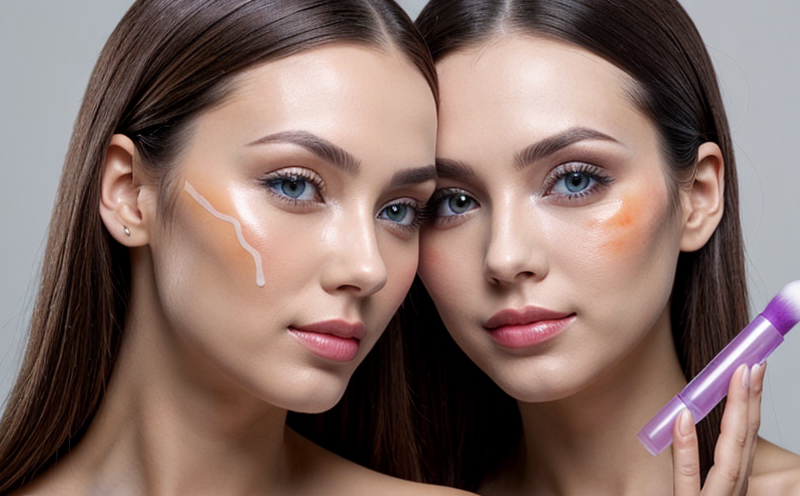Cosmetic Chemical Content Testing
The process of cosmetic chemical content testing is essential to ensure the safety and compliance of personal care products. This service involves the detailed analysis of ingredients within cosmetic formulations to identify their presence, concentration levels, and potential risks. Quality managers, compliance officers, R&D engineers, and procurement teams rely on this service to maintain regulatory standards and consumer trust.
The testing procedure starts with a thorough examination of the product’s label and formulation to determine which chemicals require analysis. The laboratory then selects appropriate analytical methods based on industry guidelines and relevant standards such as ISO 21982-2. Common tests include identifying allergens, preservatives, pigments, and other ingredients that might affect the product’s safety or efficacy.
Sample preparation is critical in cosmetic chemical content testing. It involves extracting the target compounds from the cosmetic sample using solvents like methanol or ethanol followed by purification techniques to isolate the analytes for analysis. Various instruments such as ASTM GC-MS (Gas Chromatography-Mass Spectrometry) and LC-UV (Liquid Chromatography-Ultraviolet) are used depending on the complexity of the formulation.
The results from these tests provide detailed information about the chemical composition of cosmetic products. This data helps manufacturers make informed decisions regarding ingredient selection, reformulation efforts aimed at reducing harmful substances, or enhancing product performance. Regulatory compliance is paramount; hence, adherence to international standards ensures that all test procedures align with global safety and quality benchmarks.
Understanding the nuances of cosmetic chemistry requires specialized knowledge. Our team leverages years of experience in analytical science coupled with state-of-the-art laboratory facilities equipped with advanced spectrophotometers and mass spectrometers. By providing accurate, reliable results backed by thorough documentation, we offer peace of mind to our clients.
Regulatory authorities like the European Commission mandate that certain chemicals be kept below specific limits in cosmetics. Failure to comply can result in product recalls or legal action. Our testing services help companies stay ahead of these regulations by ensuring that their products meet all necessary criteria.
In summary, cosmetic chemical content testing plays a vital role in safeguarding public health while fostering innovation within the beauty industry. Through meticulous analysis and strict adherence to best practices, we contribute significantly towards maintaining high standards across every facet of cosmetic production.
Applied Standards
| Standard | Description |
|---|---|
| ISO 21982-2 | Guidelines for the analysis of cosmetic products to detect potential allergens. |
| ASTM D5009 | Methods for determining the total volatile organic compounds content in cosmetic products. |
| IEC 62345-1 | Performance requirements and test methods for safety of electrical appliances used in hairdressing and beauty salons. |
| EN 71-8 | Requirements concerning the safety of toys - Part 8: Cosmetics intended for use by children under 3 years old. |
Quality and Reliability Assurance
- Our laboratories are certified to ISO/IEC 17025 standards, ensuring the highest level of proficiency in our testing procedures.
- We employ highly qualified chemists and analytical scientists who possess extensive experience in cosmetic chemistry.
- All samples undergo rigorous quality control measures before analysis begins.
Our commitment to excellence extends beyond mere compliance; it includes continuous improvement through advanced training programs, participation in proficiency testing programs, and staying abreast of the latest developments in cosmetic science. By adhering strictly to best practices, we ensure that every test result is accurate and reliable, thereby upholding our reputation for integrity.
Competitive Advantage and Market Impact
- By conducting thorough chemical content tests on all products before release, manufacturers can avoid costly recalls and potential legal issues.
- The ability to quickly adapt to changing regulatory requirements gives companies a strategic edge in the competitive market landscape.
- Positive test results enhance brand reputation among consumers who value transparency and safety above all else.
In today’s highly regulated environment, staying ahead of emerging trends is crucial. Our expertise allows us to anticipate future changes in regulation, enabling our clients to make proactive decisions that position them favorably against competitors. Additionally, by leveraging this knowledge base, we assist businesses in developing innovative products that meet both current and anticipated standards.





